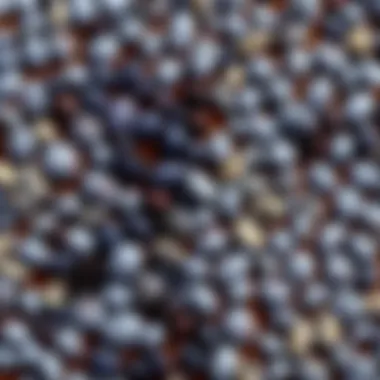Unlocking the Health Benefits of Dried Bilberry Fruits


Intro
Dried bilberries are often less recognized than their better-known relatives, but they hold substantial nutritional and therapeutic benefits. Understanding their value requires an exploration of their unique composition and health advantages, as well as their applications in both culinary and medicinal contexts. The intrigue surrounding these fruits lies not only in their possible advantages but also in how they can be seamlessly integrated into modern diets.
Nutritional Insights
Dried bilberries are packed with essential nutrients. They contain a host of vitamins, especially vitamin C and E, which are vital antioxidants that may help combat oxidative stress. In addition to vitamins, these berries provide a rich source of dietary fiber, supporting digestive health. The antioxidant properties are largely attributed to anthocyanins, which give bilberries their distinctive color and contribute to numerous health claims.
- Vitamin C: Supports immune function and skin health.
- Vitamin E: Protects against oxidative damage and strengthens heart health.
- Dietary Fiber: Aids digestion and contributes to satiety.
Consumption of dried bilberries can potentially support cardiovascular health and improve vision. Research has shown that the antioxidants in these berries may reduce risk factors associated with heart diseases. Some studies indicate that they can also enhance nighttime vision, making them an interesting area of research for eye health.
Therapeutic Uses
The journey into traditional medicine showcases the longstanding recognition of bilberries for their efficacy. Used in herbal remedies, bilberries were employed to treat various ailments, including digestive issues and urinary tract infections. The high levels of bioactive compounds contribute to an anti-inflammatory effect, reaffirming their role in traditional wellness practices. Moreover, scientific studies have begun to validate these traditional uses.
“Incorporating dried bilberries into everyday meals provides not just flavor, but significant health benefits as well.”
Culinary Applications
In the kitchen, dried bilberries offer versatility. They can be consumed on their own or sprinkled on cereals, yogurt, or salads. Their natural sweetness can enhance both sweet and savory dishes, adding depth of flavor. Chefs and home cooks alike can experiment with unique applications in baked goods, smoothies, and even sauces.
- Snack: Enjoyed as a nutritious and healthy snack option.
- Baking: Incorporate into muffins or bread for added flavor and nutrients.
- Smoothies: Blend with other fruits for an antioxidant-packed drink.
According to culinary tradition, these berries have been used in jams and jellies as well, offering a creative way to reap their benefits.
Practical Suggestions
For those interested in trying dried bilberries, incorporating them into a daily routine can be straightforward. Whether adding them to breakfast oatmeal, blending into smoothies, or mixing into granola bars, simplicity is the key. Start with small amounts to enhance dishes gradually, allowing the unique flavor to shine through. Some potential combinations could include:
- Mixing with mixed nuts for a wholesome trail mix.
- Adding to muffin recipes for nutritional enhancement.
- Using as a topping on pancakes.
Closure
The nutritional and therapeutic properties of dried bilberries present them as valuable to any diet you make. They are not only rich in beneficial nutrients but also versatile in culinary applications. The rediscovery of such less-known fruits highlights the importance of diverse dietary practices, embracing new tastes, and the potential health benefits they offer. As further studies unfold, their significance will continue to gain recognition in both modern nutrition and traditional healing.
Prolusion to Dried Bilberry
Dried bilberries, small yet potent, hold significance beyond their size. These fruits deserve attention not just for their unique flavor, but for their vast range of health benefits and nutritional properties. Understanding dried bilberries lays a foundation for appreciating their potential impact on wellness and nutrition. This introduction will explore the complexities that define dried bilberries, setting the stage for an in-depth look at their advantages and applications.
Definition and Overview
Bilberries (Vaccinium myrtillus) are closely related to blueberries but differ in taste and nutritional values. Dried bilberries are essentially fresh bilberries that have been dehydrated, preserving many of their valuable nutrients while concentrating their flavors. These dried fruits are notable for their deep blue color, which is an indicator of high anthocyanin content, key antioxidants believed to contribute to numerous health benefits.
Dried bilberries boast a range of vitality-boosting vitamins, minerals, and dietary fibers. In practical terms, they provide a rich source of Vitamin C, flavonoids, and potassium, making them beneficial additions to various dietary patterns. Availing them in a dried form enhances their versatility, allowing easier integration into a diversity of recipes and dietary habits.
Historical Context and Usage
Historically, bilberries have been used in various cultures for their medicinal and nutritional properties. Indigenous peoples in Europe consumed bilberries for centuries, recognizing their potential to mitigate health issues such as digestive problems and inflammation. Traditional European herbal medicine attributed benefits to bilberries, such as improved vision and support for overall health.


Research highlights that dried bilberries were often included in folk remedies. For instance, during World War II, British pilots were reported to consume bilberries to improve night vision, a practice rooted in their perceived health advantages. This historical context showcases a blend of cultural beliefs and practical applications surrounding bilberries, indicating their importance that extends beyond mere culinary use.
Exploring both the definition and the historical perspectives of dried bilberries offers deeper insight into their relevance in today's nutrition landscape. Such understanding is essential for appreciating how dried bilberries not only enrich diets, but also connect our past with contemporary wellness practices.
Nutritional Profile of Dried Bilberry
The nutritional profile of dried bilberries is crucial for understanding their overall potential in health and wellness. Dried bilberries are packed with vitamins and minerals that contribute to their effectiveness. Their nutritional value supports a variety of bodily functions and provides a foundational knowledge of why they are often referenced in therapeutic contexts. Moreover, their unique composition positions them as a valuable addition to any diet.
Vitamins and Minerals
Dried bilberries are an excellent source of several key vitamins and minerals. Here are some important nutrients present in them:
- Vitamin A: Influencial for maintaining eye health.
- Vitamin C: Important for immune system functionality and skin health.
- Potassium: Plays a vital role in regulating blood pressure and fluid balance.
- Calcium: Essential for bone health.
- Magnesium: Supports muscle function and energy production.
These nutrients collectively promote a range of health benefits. For users focused on supporting their well-being, incorporating dried bilberries can be a simple way to boost nutrient intake. Their combination of vitamins and minerals effectively enhances overall health. Thus, the presence of these nutrients elevates dried bilberries from just another fruit to a functional food.
Antioxidant Properties
Dried bilberries are also renowned for their potent antioxidant properties. The antioxidants in bilberries, particularly anthocyanins, contribute significantly to their health benefits. These compounds work through several mechanisms:
- Cellular Protection: Antioxidants combat oxidative stress caused by free radicals, which can damage cells and lead to chronic diseases.
- Support for Cognitive Function: There is evidence that these antioxidants may help improve cognitive health and combat memory decline.
- Reduction of Inflammation: Antioxidant properties are linked to anti-inflammatory effects, providing additional benefits to overall health.
Overall, the antioxidant richness of dried bilberries significantly contributes to their therapeutic potential. Including them in a diet may not only enhance nutrient intake but also help in preventive health measures.
Dried bilberries offer a synergy of vitamins, minerals, and antioxidants, highlighting their potential as a health-enhancing food choice.
Health Benefits of Dried Bilberry
Dried bilberry is often overlooked in discussions surrounding superfoods. Yet, this berry stands out because of its extensive health benefits, making it essential to highlight when discussing holistic wellness and nutrition. From promoting vision health to combating inflammation, dried bilberries offer numerous advantages to health. Their inclusion in the diet provides ways to support bodily functions while tapping into ancient healing traditions. Understanding these benefits creates a strong foundation for incorporating dried bilberries into daily meals.
Support for Eye Health
Dried bilberries have a direct link to eye health due to their high levels of anthocyanins. Anthocyanins, which can give berries their deep coloration, possess antioxidant properties. Research supports the idea that these compounds can improve night vision, enhance retinal function, and potentially slow the progression of eye diseases like cataracts or macular degeneration. Thus, for gamers or avid readers who often strain their eyes, including dried bilberries in their diet could make a difference.
- Substantial amounts of anthocyanins can aid in increasing blood flow to the capillaries surrounding the eyes.
- Some studies show that a diet enriched with bilberries has resulted in improvements for individuals with visual fatigue.
The vision-boosting properties of bilberries offer a tantalizing incentive for those who seek prolonged alertness during long game sessions.
Anti-Inflammatory Effects
The anti-inflammatory properties of dried bilberries present another remarkable aspect of their health benefits. Chronic inflammation plays a key role in various diseases, including arthritis and heart conditions. Consuming bilberries regularly could potentially help mitigate these effects through the reduction of inflammatory responses in the body.
Research indicates that the antioxidants present in bilberries can inhibit various pathways responsible for promoting inflammation. Individuals suffering from joint discomfort may find that incorporating dried bilberries could alleviate some symptoms, promoting easier mobility. This makes dried bilberries an approachable option for anyone seeking a complementary therapeutic approach to manage inflammation.
- Polyphenols found in bilberries have shown the ability to decrease markers of inflammation.
- Simply adding a handful of dried bilberries to culinary preparations removes some of the burden associated with inflammation-related illnesses.
Impact on Cardiovascular Health
Cardiovascular disease remains a prominent health concern globally. Dried bilberries could serve as a natural ally in the fight against heart problems. Their impressive array of vitamins, minerals, and antioxidants can provide essential support to heart health.
Studies suggest that bilberry consumption can help lower blood pressure, which is vital for maintaining optimal cardiovascular function. In addition, the nourishing components of dried bilberries support healthy cholesterol levels by increasing HDL (good cholesterol) and lowering LDL (bad cholesterol).


- Their high fiber content can further benefit heart health by promoting better cholesterol metabolism.
- Incorporating bilberries into meals not only adds taste but aids in keeping cardiovascular diseases at bay.
Bilberry supplements, or dried forms of the fruit, may represent a natural option for those struggling with their heart health, potentially paving the way for improved overall physical resilience.
Culinary Applications of Dried Bilberry
Dried bilberries have carved a niche in the culinary world, aligning both exceptional flavor with a remarkable nutritional profile. By understanding the uses of this unique fruit, one can integrate it seamlessly into engaging meals. Diving into the recipes and ways these berries can enhance different food experiences is essential for elevating everyday dining. More than just a garnish, they can enrich both taste and nutrient density.
Incorporating Bilberries into Meals
Exploring dried bilberries in meals introduces versatility and adds layers of flavor. Whether they are sprinkled over salads or stirred into sauces, such applications amplify both taste and nourishment. Here are practical ways to incorporate bilberries effectively:
- Salads: Mixing dried bilberries with leafy greens such as spinach or arugula not only looks visually appealing but also increases the antioxidant kick. They provide a chewy texture, contrasting nicely with crunchier elements like nuts or seeds.
- Grains: Adding dried bilberries to cooked quinoa or rice introduces moisture and sweetness to otherwise neutral flavors. This uplifts the dish while contributing beneficial nutrients, making it a health-packed side dish.
- Smoothies: A few bilberries add an intriguing twist to smoothie blends. Combining them with yogurt and your choice of fruit can boost vibrance in flavor and prepare a nourishing breakfast or snack.
- Savory Dishes: Experimenting by blending bilberries into savory sauces, especially for meats like duck or chicken, can provide an unexpected depth. Their unique sweetness can balance out acidity in tomato-based or vinegar sauces.
Bilberries in Baking and Confections
Baking is a wonderful medium for showcasing the juicy burst of dried bilberries. They infuse both flavor and color into baked goods while presenting health benefits, making them a compelling choice in many recipes. Consider the following points when using bilberries in your baking endeavors:
- Muffins: Incorporating bilberries into muffin batter not only enhances flavor and nutritional value but also enriches texture. Their presence can elevate standard recipes, making mornings more enjoyable.
- Cookies: Substituting raisins or chocolate chips with dried bilberries in cookie recipes leads to a laid-back twist with health perks. The unique taste can refresh classic cookies while introducing additional phytochemicals.
- Cakes and Pies: Utilizing bilberries in cakes introduces a sweet and tart complexity; consider blending them into batters or using them in fillings. In pies, toning down sugar levels while allowing the natural sweetness of bilberries to stand out is key.
- Treats: Crafting energy bars or granola mixes with dried bilberries introduces nutritious elements. Their chewy texture complements other ingredients, leading to snacks that offer satisfying energy boosts.
The enhancement provided by dried bilberries serves both functionality and flavor. They are a pathway toward not only a delicious meal but also robust health benefits.
Incorporating dried bilberries into culinary practices serves to engage taste buds while fostering health consciousness. They are approachable yet versatile enough to find their place in various cuisines. Their culinary charm offers an addeed layer to daily dining experiences.
Traditional and Folk Medicine Uses
The use of dried bilberry in traditional and folk medicine is a compelling aspect that illustrates the fruit's cultural and health significance. Throughout history, various cultures have turned to bilberries as part of their herbal remedies. An appreciation for their medicinal potential stems from both empirical observation and shared knowledge among communities. By understanding these uses, one can appreciate the rich tapestry of knowledge that surrounds this fruit.
Cultural Significance
The cultural underpinnings of dried bilberry are essential to grasping its role in herbal medicine. In many regions, it has been acclaimed not only for its nutritional properties but also as a symbol of resilience and survival in the face of seasonal changes.
- Indigenous peoples used bilberries extensively, often recognizing their benefits for health. This aligns with a broader understanding of nature's bounty and connection to land.
- In Europe, folklore intertwines bilberries with protection against ailments and sorcery, suggesting that they were considered a mystical ally.
- Community-sharing focused on bilberry-related harvest festivals, expressing deep-rooted identities and respect for nature.
Writing about bilberries allows one to contextualize their importance, which went beyond food to encompass healing practices and herbal formulations that shaped local identities.
Past and Present Remedies
The guiding designs of traditional remedies featuring dried bilberry reveal much about their status in folk medicine. Previously, bilateral relationships were often cemented between herbalists and community members. Ways to utilize bilberries for health benefits include:
- Eye Health Support: Many cultures touted bilberries for their impact on vision. Anthocyanins found in these berries were thought to bolster eye health, addressing issues associated with night vision and eye fatigue.
- Digestive Aid: Traditionally, bilberries were consumed or made into infusions aiding digestion, often classically paired with other botanicals helpful for gut health.
- Inflammation Combat: Herbal practitioners employed bilberry leaves and fruits for their anti-inflammatory potential, particularly in various teas or tinctures aimed at relieving different forms of swelling.
- Urinary Tract Health: Dried bilberry berries historically carried recommendations for urinary health, functioning similarly to cranberry in preventing infections or furthers urinary complications.
- Glycemic Support: Folk medicine also saw in bilberries a potential ally for those managing blood sugar levels, leading to educative trends about meal planning and natural hedge against diabetes.
In sum, while nutritional research continues to assign scientific credibility to these traditional beliefs, the historical narratives of bilberries as a remedy influence today’s herbal practices. Health practitioners continue to draw from this deep reservoir of tradition, thus merging ancient wisdom with contemporary understanding.
“Disease knows not color, fears nor tribe; Nature's solution lie often hidden upon hillside.”
The integration of dried bilberry in current dietary approaches pays homage to these traditions, as ongoing scientific exploration supports what many ancestors hailed as life-giving prowess. Their historical trajectory invites numerous inquiries into traditional practices related to health, helping establish the bilberry fruit both as a dietary inclusion and herbal safest that speaks to enduring legacy of natural remedies.
Scientific Research and Studies
Scientific research on dried bilberry is crucial in today’s health-focused society. As more people become interested in natural alternatives to support their health, understanding the science behind ingredients like bilberries is significant. Recent studies provide insight into the nutritional value and how these fruits can be beneficial. Furthermore, they can illuminate potential therapeutic uses beyond basic nutrition, making them a topic worth exploring.


Clinical Trials and Findings
Clinical trials focused on dried bilberry have uncovered several interesting findings. Key studies have typically centered around their antioxidant properties and benefits for eye health, confirming many traditional claims.
- Visual Health: One important research area shows that bilberry extracts may enhance night vision. Participants taking bilberry supplements reported improved visual acuity under low-light conditions. An experiment conducted on this subject indicated a measurable improvement, demonstrating bilberry's potential effectiveness.
- Diabetes Management: Another set of trials explored the role of dried bilberries in glucose metabolism. Those with diabetes consuming bilberry showed improved insulin sensitivity. These findings suggest dried bilberries might contribute positively to blood sugar regulation.
- Combating inflammation: Various findings highlight the anti-inflammatory qualities of bilberry. Studies indicate a reduction in systemic inflammation markers, suggesting that bilberry consumption could be valuable for conditions involving chronic inflammation.
Studies reveal that dried bilberries can actively contribute to health, especially concerning visual and metabolic benefits.
Regardless of the promising results, it is essential to continue supporting these preliminary findings with larger studies that further examine efficacy and potential side effects. Clinical trials act as the groundwork providing knowledge about informed consumption of dried bilberries.
Ongoing Research Areas
The field surrounding dried bilberries continues to advance. Ongoing research aims at both understanding their mechanisms and identifying new applications.
- Neurological Benefits: Researchers are currently interested in examining bilberry extracts’ effects on cognitive function. Early studies point toward potential benefits in memory and focus, vital for players needing concentration during extended gaming sessions.
- Gut Health: Another promising area of inquiry concerns the prebiotic impact of dried bilberries. As the scientific community increasingly examines gut microbiota's role in overall health, bilberry could reveal new advantages for digestive wellness.
- Chronic Disease Prevention: Longitudinal studies continue to assess the overall health impacts of regular bilberry consumption, especially related to diseases like heart disease and type 2 diabetes. Researchers aim to understand long-term health outcomes associated with including bilbery ofta in dietary regimens.
The evolving research landscape underscores the importance of dried bilberry as a subject worthy of attention among health enthusiasts. Advancements here might enhance holistic dietary approaches within the overall wellness discussions.
Potential Risks and Considerations
Understanding the potential risks and considerations associated with dried bilberries is essential for all consumers. While this fruit offers numerous health benefits, it is crucial to approach its consumption with awareness. Some individuals might experience allergic reactions when consuming dried bilberries, warranting careful examination. Additionally, the possibility of herbal interactions with various medications heightens the importance of considering these risks.
Possible Allergic Reactions
Allergies to bilberries can occur, though they are relatively rare. Specific symptoms of an allergic reaction can range from mild discomfort to more severe issues. Common indications include skin rashes, itching, and gastrointestinal disturbances. Some individuals may also experience more severe reactions like difficulty breathing, known as anaphylaxis in extreme cases. It is advisable to start with a small quantity of dried bilberries if you are trying the fruit for the first time.
Knowing the signs of an allergic reaction is important. Always be cautious if you are prone to allergies with other berries or similar fruits. Here are key characteristics of an allergic reaction:
- Skin Rashes: Redness and irritation on the skin.
- Gastrointestinal Issues: Nausea, vomiting, or diarrhea.
- Respiratory Symptoms: Wheezing and difficulty in breathing could indicate severe reactions.
Allergic reactions can vary widely between individuals, making it prudent for anyone with allergies to consult a healthcare professional before introducing dried bilberries into their diet.
Interactions with Medications
Dried bilberries may interact with certain medications, affecting their efficacy or leading to unintended side effects. This is particularly true for individuals on anticoagulants, such as warfarin, as bilberries possess blood-thinning properties. When consumed alongside these treatments, they could enhance the medication's effects, leading to increased bleeding risks.
It's important to also consider the implications for individuals taking diabetes medications. Dried bilberries might influence blood sugar levels, hence monitoring is advisable. Here are a few considerations about medication interactions:
- Anticoagulants: Increased bleeding risk.
- Diabetes Medications: Potential changes in blood sugar levels.
- Blood Pressure Medications: Possible variations in effectiveness.
Consulting a healthcare provider becomes essential when wanting to incorporate dried bilberries into your routine while on medications. Proper knowledge can help mitigate risks while maximizing health benefits.
End
The conclusion of this article seeks to encapsulate the importance of understanding dried bilberry within the broader context of nutrition and health. Revealing its potential mirrors an opportunity for many, whether it is for conscious eating or for medicinal leverage. Dried bilberry is not merely a food item; it stands as a testament to the intersection of nature, health, and culinary creativity.
Summary of Key Points
The exploration into dried bilberry highlights several essential aspects:
- Nutritional Benefits: Dried bilberries are rich in vital vitamins, minerals, and antioxidants, promoting holistic health.
- Therapeutic Applications: Their anti-inflammatory properties as well as support for eye health further cements their place in both classical and contemporary therapeutic practices.
- Culinary Value: They can enhance various dishes and desserts, making the integration in daily diets not only nutritious but also enjoyable.
- Traditional Significance: Deep-rooted in cultural practices, dried bilberries maintain importance in traditional medicine that is still relevant today.
- Research Scope: Continuous studies aim to further unravel their health benefits and potential risks.
Final Thoughts
In summary, the blending of nutrition, history, and culture creates a complex framework highlighting dried bilberry as more than just a berry. They merit a place in our diet. While emphasizing risks, particularly around medicinal interactions or allergic reactions, recommending caution ensures safe incorporation. Each nutritional element and health benefit discussed leads us to consider integrating dried bilberry into diverse culinary creations. By doing so, one enriches both dietary habits and wellness practices. Encouraging curiosity about these potentials aligns well with overall health goals — nurturing an informed society while enjoying the flavors well-deserved.
Proper knowledge and attitude empower choices — the symbiosis of food and health is a crucial ethos for modern living.







